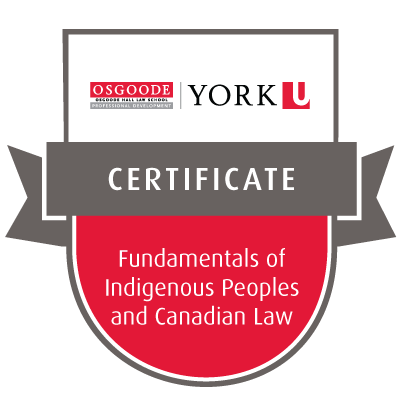
Osgoode Certificate in Fundamentals of Indigenous Peoples and Canadian Law
Issued on: 6.2.2023
Earner: Em Raby
If your work engages with Indigenous issues, this is the foundational grounding you need to navigate this complex area.
This Osgoode Certificate is a comprehensive five-module program that provides a a concise, deep dive into the knowledge and strategies professionals need to be able to work more thoughtfully and effectively when dealing with Indigenous law issues.
A truly outstanding faculty of experts, including practicing lawyers, government and industry reps and academics drawn from across the country will concentrate on the core aspects of Indigenous law, focusing not just on the law itself, but also those practical considerations that are key to understanding the rapidly changing legal environment.
Criteria
What You’ll Learn
The aim of the program is to give you a practical and foundational understanding of Indigenous rights and title, the constitutional framework, reserve lands and developments on reserve, treaty interpretation, modern treaties, the duty to consult framework and practical strategies.
- The historic narrative and constitutional framework
- An overview of the case law and key legal concepts from the last 40 years
- Understanding historic treaties – the context, perspectives and contemporary realities
- The Indian Act: key issues for practitioners and policy makers
- “Section 35” – understanding its purpose, framework and emerging issues
- Understanding modern day treaties using case studies and a Canada wide comparative analysis, including First Nation, Inuit and Métis perspectives
- Addressing overlapping territories, private lands, submerged land and waterways
- The Duty to Consult and Accommodate – its origins, recent case law developments and current practices
- Consultation approaches, policies and perspectives across Canada, including best practices
- Indigenous self-governance
- UNDRIP and what it means going forward
Assessment Criteria
In order to obtain the Certificate, the learner must:
- complete/attend all modules;
- complete the reflective exercise; and
- successfully complete an online assessment, obtaining at least 80%.
Estimated learning effort
Approximately 35 hours of learning effort, spread over multiple weeks.